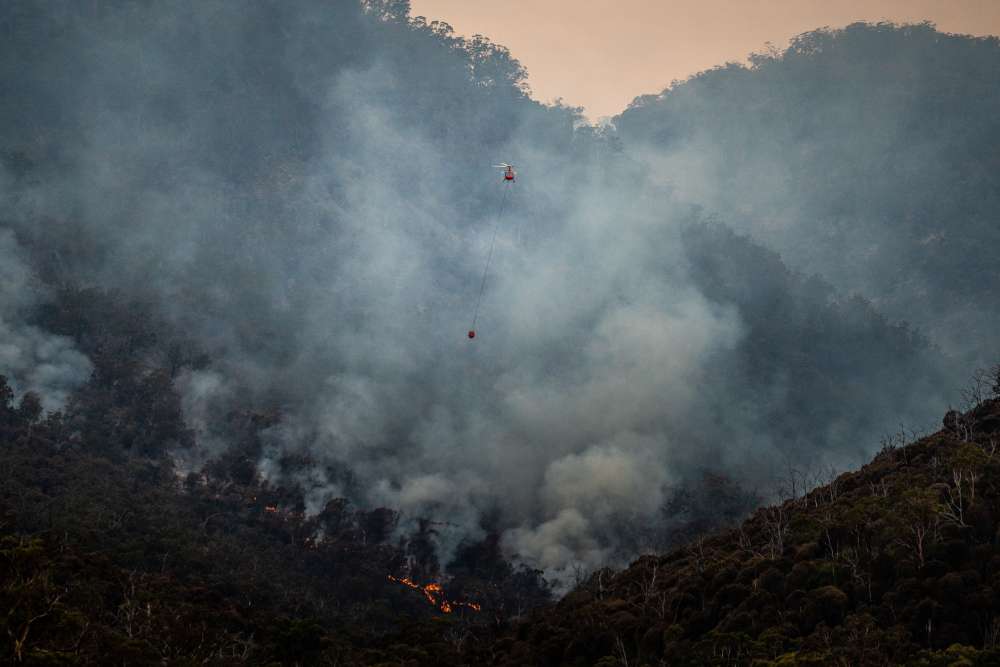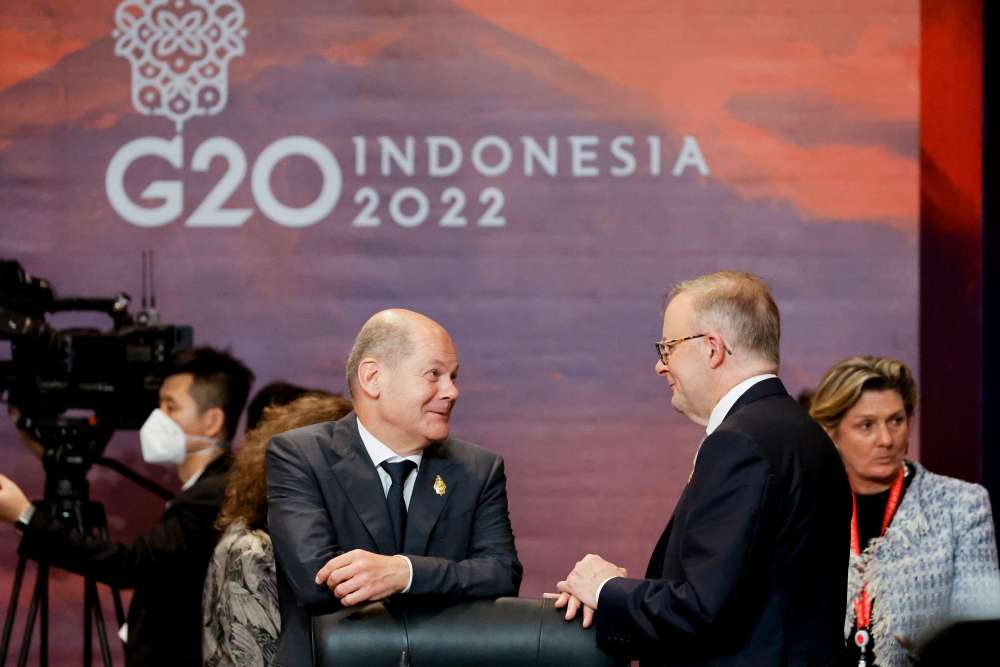In a Globalized World, No Security Without Climate Security

(Matt Palmer/Unsplash)
Because they are driven by narrow concepts of security, security strategies typically end up looking for answers to new threats in the same old places. But Germany still has a chance to do it differently.
Developing a national security strategy in a globalized world is as complex an undertaking as it is urgent. Not only are we faced with worsening relations between the world’s great powers and a major war in Europe – with all its consequences –, we are also racing toward irreversible climate and ecological breakdown. No national security strategy can ignore this reality. Yet typically, national security strategies (and the German government’s plan appears to be no exception) are drawn up in response to ‘traditional’ (meaning violent) security threats. It is no wonder, then, that they end up searching for answers to new threats in the same old places.
Here, however, the German government may still prove itself different. It indicated early on that it intends to consult widely. And over the course of the summer 2022, for instance, it hosted a series of roundtables with civil society. But will that be enough to meet the challenge of climate breakdown? A new approach to defining security as well as the way in which security strategies are generated is necessary to meet the threat that climate change poses.
Key Points:
- The purpose of a security strategy must be to protect human life and the planet, which means tackling climate change at its root causes and confronting the drivers of insecurity. Doing so requires a new definition of security.
- Policymakers must move beyond siloed responses to climate breakdown and include both technical experts (e.g. climate scientists) and those with lived experiences of climate-related shocks in security discourses.
- Germany should: help other states transform domestic sectors like energy, food and transport for sustainability; contribute to loss-and-damage compensation schemes; and shift away from investments in militarized security.
Definitions Matter
In the German government’s communications about its first National Security Strategy, the Federal Ministry of Defence (BMVg) indicated that the document will be based on a broad concept of security and cites the 2021 floods in the German Ahr Valley, the current energy crisis (a result of the war in Ukraine) as well as the COVID pandemic as examples of issues that need a security response.
However, as participants in the BMVg’s related roundtables pointed out, it is civilian institutions that should be adequately resourced to deal with civilian issues – rather than involving the Bundeswehr (Germany’s army). This highlights a problem with a broad concept of security: when threats to civilian life are deemed security issues, the response is usually “securitized.”
» A problem with a broad concept of security: when threats to civilian life are deemed security issues, the response is usually “securitized.” «
For those who have been at the forefront of fighting the climate crisis and have based that work on notions of sustainability and global cooperation, describing climate change as a security issue can often set off alarm bells – and rightly so. Rather than defining the climate crisis as a security issue within the current militarized thinking, then, it is the whole concept of security that has to be rethought.
Rethinking Security to Address Climate Breakdown
In a world where the adverse effects of climate breakdown – such as food insecurity, mass migration, and economic and social collapse (to name but a few) – will only worsen for millions if the pursuit of “security” continues to be based on competitive international relations and the quest for dominance, it is crucial that we develop a new definition of security that addresses the root causes of insecurity.
National security is usually defined as the protection of the state and the integrity of its borders, so that those living within those borders can enjoy the continuance of the freedoms and privileges they are accustomed to. In relation to climate change, this might mean ensuring that infrastructure can withstand extreme weather events, that there are plans for maintaining energy and food supplies should the usual method of importing these commodities face disruption, or readying the military to disperse aid overseas after disasters. It may also include a foreign policy that helps to strengthen other governments under strain by an influx of populations displaced by flood or famine. These strategies may all be necessary and useful.
However, to really address climate breakdown, the purpose of a security strategy must ultimately be to protect the sustainability of human life and the planet itself – in other words, to tackle climate change at its root causes and confront the drivers of related insecurity, such as scarcity and competition, over-consumption and inequality. It should prioritize cooperative international relations, sustainable agriculture, renewable energy development, and other regenerative practices.
The expertise for this is unlikely to be found in the security policy establishment. Therefore, how a security strategy is developed must also be rethought.
Finding Sustainable Solutions
In order to address climate breakdown, policymakers must move beyond siloed responses to its effects and think holistically. They must speak to those with the technical knowledge, like climate scientists, and those with lived experiences of climate-related shocks who have been trying to address the underlying causes and many of whom will not normally be included in security discourses.
The UN Development Programme (UNDP) has consistently included “agency” as a key principle for achieving human security (which necessitates climate security): those whose insecurity is being addressed should be part of finding security solutions. The recently updated UNDP report New Threats to Human Security in the Anthropocene, for example, dedicates a full section to the recognition of indigenous people’s care for the Earth. It is more than appropriate for those working on strategies to support climate security to first listen to others who are closest to and depend on land and farming. In fact, only then can we avoid a securitized response like competing for natural resources or “dealing” with climate refugees.
» Those whose insecurity is being addressed should be part of finding security solutions. «
The same UNDP report also includes solidarity as a guiding principle for developing human security. This is decidedly different form traditional national security rhetoric that tends to see the world through the lens of competition and thus seeks security through (military) supremacy or alliances that create such dominance.
Recognizing the finite resources of the planet, states must do better than they have done at past Conferences of the Parties (COP) and work together to find alternatives to economic growth and military competition in order to create sustainability and reduce emissions.
Germany’s Role
For a rich country like Germany, efforts to work with others to address the drivers of insecurity caused by climate change should include several key commitments.
First, the German National Security Strategy should support the development of a foreign policy that seeks to build cooperative international relations to allow all states to adapt sectors such as energy, food and transport for sustainability. In cooperative international settings it is also important to address the global economies of energy and agriculture. Allowing multinational companies to set the agenda and base these sectors purely on market principles does nothing to support energy and food as well as, ultimately, climate security. Trade union and environmental movements advocate that these commodities be considered human rights. More support for individual countries to set their own agenda for sustainable food and energy generation is crucial. Western governments should rethink decision that prioritize strategic relationships with oil, gas or coal producers to “secure” fossil fuel imports.
» Allowing multinational companies to set the agenda and base these sectors purely on market principles does nothing to support energy and food as well as, ultimately, climate security. «
Secondly, Western nations with a historically high carbon foot print – such as Germany – must commit to contributing to the loss-and-damage fund set up through COP27 that will support vulnerable nations in repairing what they have already lost as a result of the climate crisis, in addition to providing funds for mitigation and adaptation. This should be seen as a security issue.
Last but not least, we should not forget that militaries are heavy polluters which currently do not have to report their carbon footprint. Whatever other priorities are enshrined in Germany’s upcoming security strategy, it is clear that creating climate security is incompatible with increased militarism. At a minimum, the security establishment and Germany’s defense ministry in particular should play their part in fully supporting the government’s obligations to reduce greenhouse gas emissions.
If conflicts induced by the impacts of climate breakdown – such as increased refugee numbers or economic and societal collapse – are to be avoided, Germany must support sustainability in all major sectors, contribute financial support for loss-and-damage compensation, and shift away from investments in militarized security. These are all necessary steps in building security in a globalized world. And efforts to contribute to the sustainability and resilience of societies in the face of climate change will be fundamental for the shared security of all who depend on the planet – today and in the future.
Joanna Frew
Activist, Researcher & Outreach Coordinator, Rethinking Security Network
Weiterlesen

Embrace Multipolarity: Germany Must Act European for the Global Common Good
To promote a more peaceful world, Germany needs to move past primarily national strategies and start thinking European. The best way to do that: support a strong global role for the European Union.

Pandemische Erreger als biologische Waffen: Deutsche Biosicherheit neu denken
Das Risiko für katastrophale Pandemien steigt. Fortschritte in der Biotechnologie könnten es bald tausenden Individuen ermöglichen, pandemische Viren künstlich herzustellen und als biologische Waffen zu missbrauchen.
